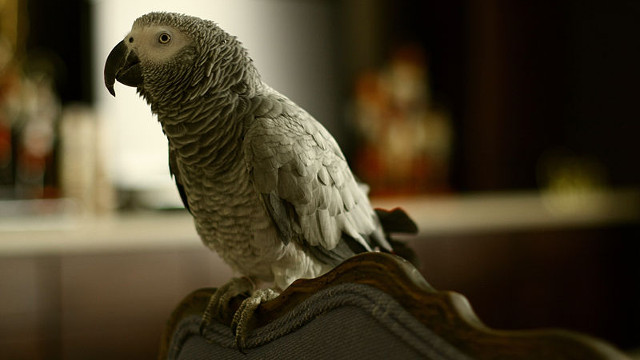 A pet African grey parrotWIKIMEDIA, SNOWMANRADIOA key notion in ethologist Frans de Waal’s latest book is anthropodenial, the a priori refusal to attribute to animals any kind of human-like mental traits. In his best-selling new book, Are We Smart Enough to Know How Smart Animals Are?, de Waal states that anthropodenial has long been the prevailing attitude among scientists and philosophers: in order to preserve the special, exalted position of Homo sapiens they simply move the goal posts each time some behavior is found in animals that had previously been considered uniquely human, such as tool use, self recognition, or empathy. De Waal’s words carry weight, not only among researchers but also among society at large. In this uneasy age of bio-industry, dwindling bio-diversity, animal rights activism, and quick-to-flare sentiments, this saddles him with a special, informal but nonetheless real responsibility.
A pet African grey parrotWIKIMEDIA, SNOWMANRADIOA key notion in ethologist Frans de Waal’s latest book is anthropodenial, the a priori refusal to attribute to animals any kind of human-like mental traits. In his best-selling new book, Are We Smart Enough to Know How Smart Animals Are?, de Waal states that anthropodenial has long been the prevailing attitude among scientists and philosophers: in order to preserve the special, exalted position of Homo sapiens they simply move the goal posts each time some behavior is found in animals that had previously been considered uniquely human, such as tool use, self recognition, or empathy. De Waal’s words carry weight, not only among researchers but also among society at large. In this uneasy age of bio-industry, dwindling bio-diversity, animal rights activism, and quick-to-flare sentiments, this saddles him with a special, informal but nonetheless real responsibility.
The essential burden of science is to replace dogma, sentiment, and superstition with an as-far-as-we-now-know theory based on verifiable facts, all the while striving for objectivity. Yet, in his work, de Waal replaces one dogma—the Cartesian/behaviorist stance that animals are mere oblivious response machines—with another. Following “Charles Darwin’s well-known observation that the mental difference between humans and other animals is one of degree rather than kind,” de Waal notes that there is no fundamental difference between man and beast—not even mentally. The problem is not the idea, it is that de Waal posits this as a preordained fact to be illustrated rather than a hypothesis to be tested.
In order to make this stick, de Waal redefines intelligence as whatever mental capacities a given species ...



















